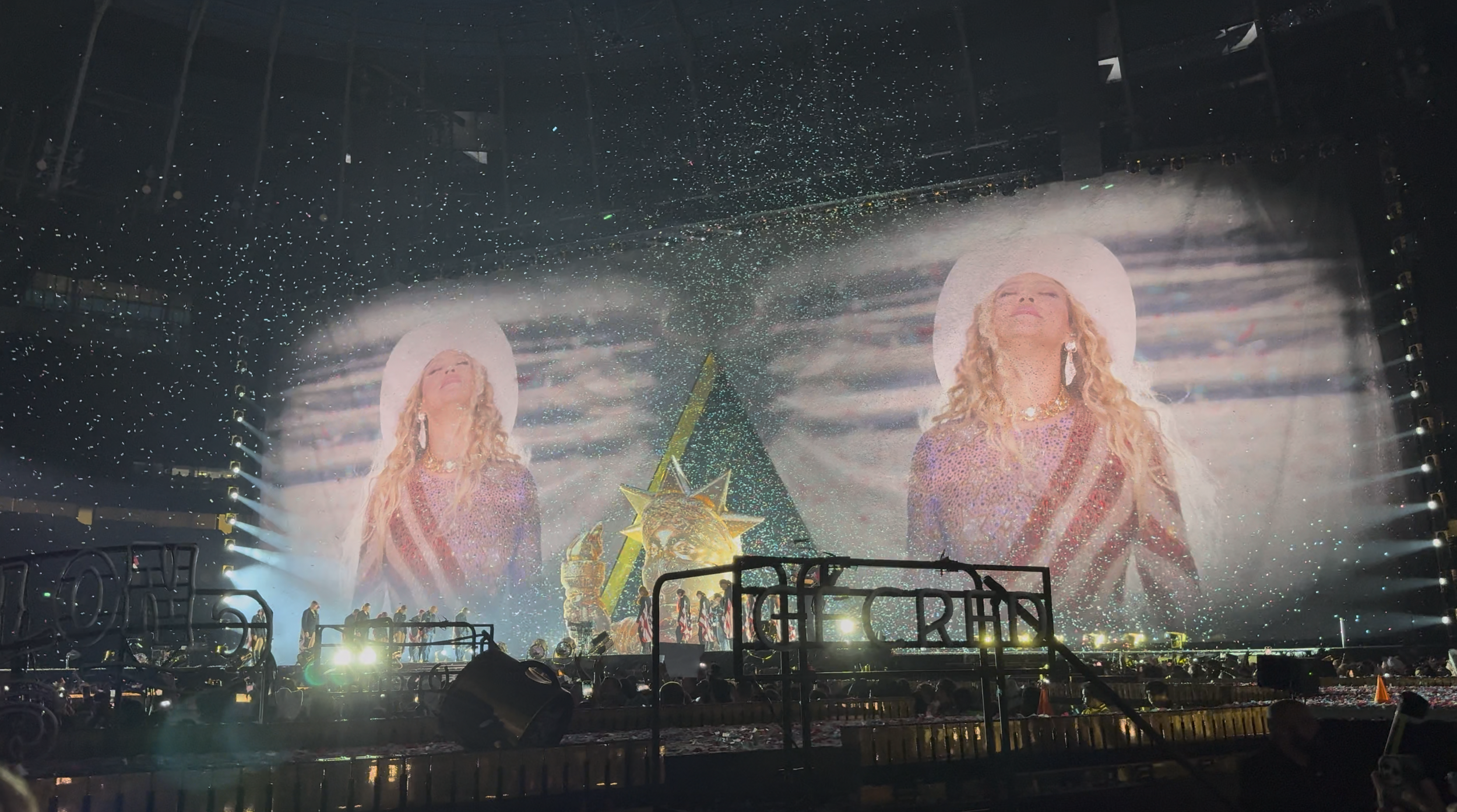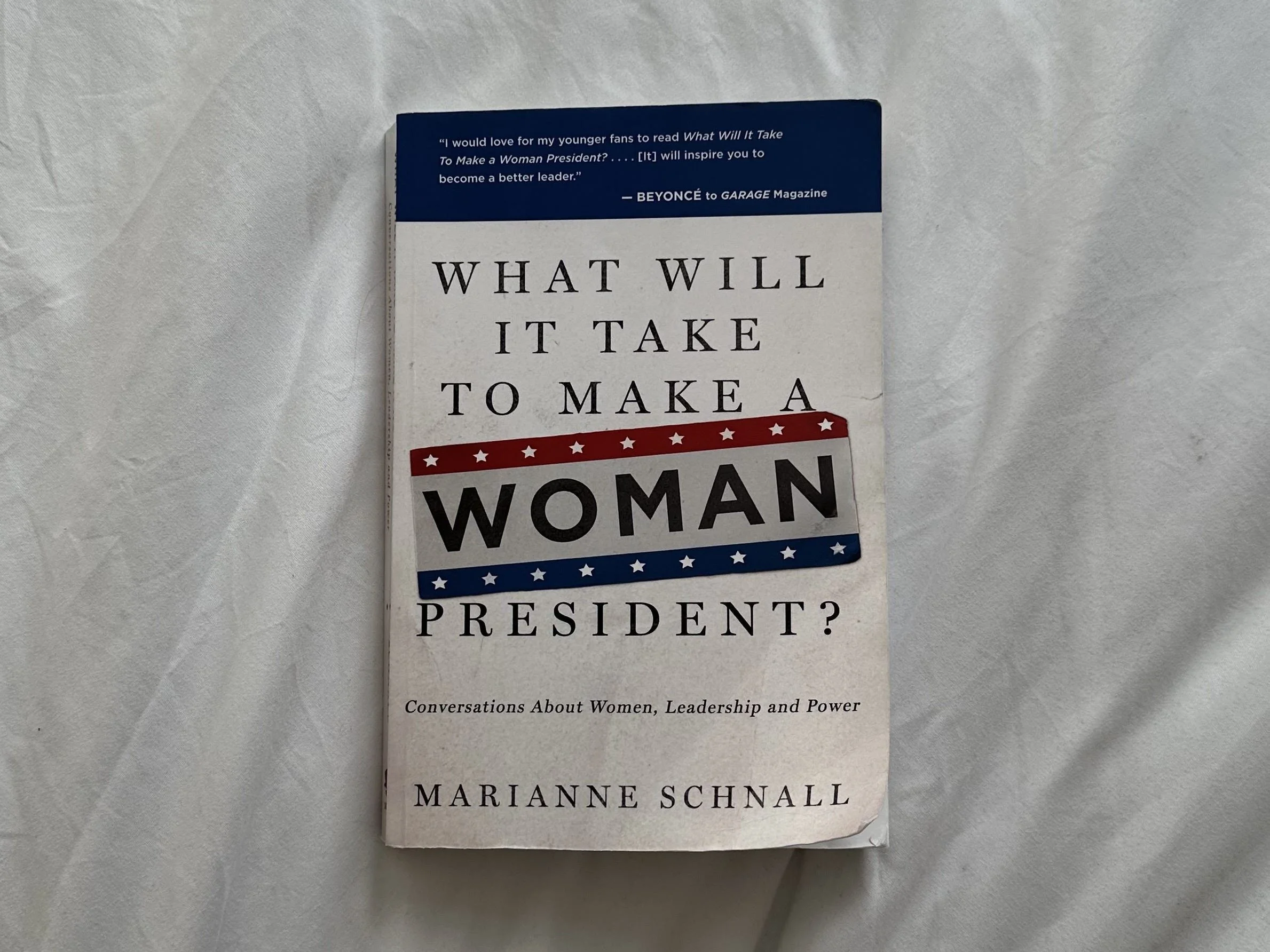What will it take to make a woman president?
I ordered the book Beyoncé once recommended, expecting hope. What I found instead was a reminder of how heavy womanhood feels in 2025.
I saw Beyoncé on June 16th, and I’d say my life hasn’t been the same since. There was life before, and there is life after. If you’ve been to her concerts, you’ll get it. If you haven’t, you probably think I sound unhinged.
Following the show, I wanted to know HOW??? I’m an honorary Beyhive, I’ve seen all the movies, films, videos, interviews, but I wanted to know more. What did Beyoncé consume? How did she learn history? What formed her mind? So I consulted my favourite solver of inquisitive moments- chat GPT.
Buried in the list of answers was this line:
“Speaks rarely on what she reads but in 2016 recommended What Will It Take to Make a Woman President? by Marianne Schnall”
Without even knowing what it was about, the title combined with Beyoncé’s stamp of approval made me order the book immediately. I read it every night before bed. For the first time since Year 11 GCSE English Lit classes, I decided to read aloud. As the book is a collection of converasations, I believed I’d “take it in” and understand some of the complex parts easier. I was right. It’s the first non-fiction book in a long time, that I’ve breezed through.
To summarise it’s Marianne Schnall talking with a plethora of influential/powerful women and men in politics, entertainment and leadership. She’s asking them why they think there hasn’t been a woman president, and delves into a conversation of discovery into the subject. I’m going to be brutally honest, as a woman, it’s not a fun read. This book was published in 2013. A DECADE ago. And whilst there is so much hopeful enthusiasm and pledges for progress, it reads very differently ten years later. Many of whom champion Hillary Clinton as the next president, or the first woman we will see, and knowing that didn’t happen, despite her qualifications and experience - it’s disheartening. Probably even heavier to digest, was the mention of how amazing it was to have passed Roe v Wade. It stopped me cold. I literally closed the book, stared at the wall, and felt my jaw drop. Whilst none of it is a surprise, it was harrowing to read passages reaffirming the struggle of women, the prevalent patriarchy and see the regression the country has faced.
As a Brit, it left me feeling deep sadness for our friends across the ocean, but equally lots of the opinions mentioned are not exclusive to the states. Reading this book ignited a repressed rage in me that came up a lot in recent therapy sessions. You see, I went to an all girls’ catholic high school for 4 years, something I have never seen as a superior choice- until I read this book. When I moved to a mixed school, a lot of the kids, and even teachers, asked me about the differences, how did it feel, what was it like. There were subtleties: the girls school was bitchier and stricter, yet everyone felt like a tight family; on the other hand, the mixed school definitely felt like a business, bigger, newer buildings, fancier things. It wasn’t until I read this book that I could finally appreciate the benefit to me growing up in a school of only girls; everyone was equal. There was no prejudiced societal opinions and roles that meant I was treated differently to the boys in my class- because there were none.
The book explains how teachers unknowingly do interact differently with the boys and girls. How many young children around the age of 5 would both say “one day I want to be president”, yet through conditioning by teenage years the number of girls that share that same dream will have almost diminished. This specific example stuck with me, because I remember being in year 7, aged 12 in French class saying I wanted to be prime minister. I always had an interest in politics, and I question whether I would’ve been as overt and confident if there had been boys around in those years. I’d be interested to hear if any of you who did attend a mixed school are reading this now and feeling like I just pieced your puzzle together. Another example is the subject choices, all my classes were girls, so there was ZERO factor of gender in choosing which subjects I was going to take. There was also way less emphasis on looks - granted this was still Liverpool (I started getting my brows done when I was 8) - but in the grand scheme of things, everyone was just more comfortable without the boys to “impress”. A phrase that should be irrelevant at that age anyway, yet thanks to society, and some friends I have who grew up in mixed schools- I can say with certainty it was used.
Unsurprisingly we’ve got a bit off topic - back to the book. The point it was making, is that society still raises men and women differently. It’s a huge reason for the disparity we see now. It’s misaligned, and whilst it’s tough to generalise such a convoluted conversation (I urge you to read the book) it’s probably one of the main reasons we still face so much struggle. There are so many threads we could explore, after all we’re discussing half of the population, my mind wants to mention how it leads the conversation of there “not being enough good men left”. A topic I’ve previously suggested on my TikTok (much to the dismay of the mean males in my comment section) and whilst I will save that for another post, the argument is seemingly backed by science. It says that women have evolved, from housewives and mothers to that AND students, leaders, workers. They’ve surpassed males in many ways that society hasn’t wholly recognised or evolved to meet. This leads to other threads of gender pay gap and unequal numbers in many government/leadership roles. Women are still newer to this society than men and we are still experiencing those “teething problems” yet it seems nobody is talking about it.
I vividly remember calling myself a feminist when I was at the all girls school. We were celebrated and championed to support women and push for equality. When I got to the mixed school and mentioned the themes I’d learnt and discussed previously I was met with a VERY different set of opinions and discourse- all the girls there dismissed feminism, in fact they actively disagreed with the word and wanted nothing to do with it. I remember feeling shocked, ashamed and honestly confused. Now with hindsight I understand two things: Firstly, that I am so glad I went to an all girls school, and Secondly, that they’d been fed the extreme definition of the word, the man haters- and with the males and high percentage of male teachers, I assume that tainted their desire to call themselves a feminist.
What I’m about to say next is not always what I believe- my perspective changes based on the day and the circumstance- but having just read the book and gathered a few examples for this piece, it’s that ultimately Women are not celebrated or rewarded as much as men. Molly Mae is my favourite proof, she was absolutely berated for saying the same exact words I’d heard from tons of men before on the exact same podcast “we all have 24 hours in a day” I’m not here to argue the context of her statement and it’s ignorance to others- I’m here to say when a man said it, the criticism did not erupt in the same way.
The very sad truth I believe is that a woman is held to much higher standards than a man is. Whilst there has definitely been progress made from the generations that have come before us, we are still nowhere near where we should be.
I feel very passionately about this topic, a flame is lit within, that we must keep this conversation alive. Not just online, but in person, with friends- especially our male counterparts. I remember a truly shell shocking few conversations I had with a male boss that left me speechless. Let the record show, I do think he was being inquisitive and ‘a wind up’, but on one occasion he bounced into the office with the statement “I think all girls should do onlyfans- if I had a girlfriend I’d want her to”. As everyone picked their jaws off the floor, an entire office debate took place, mostly telling him to stop rage baiting, but quickly silenced following the question “what if your daughter did it?” Same man, another day was praising salacious, pornographic and objectifying adverts as 100% genius- an interesting debate I’m saving for my next post because frankly that’s a thread that leads to an entire blanket of patches filled with comments and questions.
Whilst it’s exhausting to keep having these conversations and educating people- it’s necessary. At a time when violence against women is high, and American governments are taking steps backwards. The optimism on those pages, the belief that we were on the brink of change, felt like a time capsule from a world that doesn’t exist anymore. Ten years on, the answers in that book have grown heavier, almost mocking- a handbook for a future that seemed so close we could almost touch it. Yet now a decade later, what I read didn’t incite hope, but instead heartbreak.
If you’d like to read it, this is an affiliate link, I’ll earn pennies in commission should you purchase the book https://amzn.to/3HrMsMH
Now I’ve finished this write up I honestly feel sad again, which gives me a cheesy cringe way to flow into asking; if you want to put a smile on my face, please subscribe to my SubStack and let me know your thoughts.
Thankyou for reading <3 Ella


